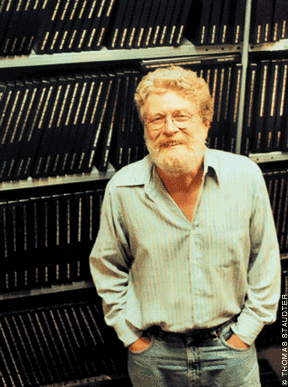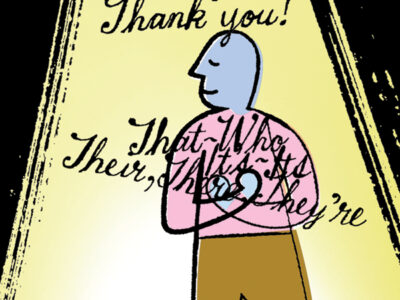
Class of ’70 | Less than a year after his Penn graduation, Michael Cuscuna C’70 ran into Miles Davis backstage at a concert in Manhattan. By then, he was already hosting his own morning radio program at one of New York’s top FM radio stations and establishing himself as a music writer and record producer.
“Hey, Michael—friends tell me you’re a big-shot deejay here in town,” rasped the famed and often acerbic jazz trumpet legend. Momentarily speechless, Cuscuna was about to respond when Davis added, “You know what I told them? ‘So what!’”
Perhaps Davis was merely tweaking him with the title of one of his most famous compositions. Perhaps he would also, if alive today, be more impressed by Cuscuna’s role as a jazz archivist whose efforts at producing collections of reissued recordings are second to none. That Cuscuna, a workaholic and relentless promoter of America’s Great Musical Idiom, should become one of the chief curators of Miles Davis’s chosen medium should surprise no one. Having worked to keep the music of countless jazz legends alive during the past three decades, the 58-year-old Cuscuna was a natural consultant for any major music-reissue project. As a result, in a unique agreement between Sony Music Entertainment and Mosaic Records—the mail-order company Cuscuna co-founded in 1982—several multi-CD sets of the trumpeter’s masterful oeuvre, carefully re-mastered from the original studio tapes and annotated with scholarly precision, have been released over the past 10 years. (The latest is Seven Steps: The Complete Columbia Recordings of Miles Davis 1963-1964.)
The Davis reissues constitute a small fraction of what Cuscuna has rescued or compiled from the record-company vaults and brought forth into the digital age.
“For generations to come, historians and listeners of jazz all over the world will be indebted to Michael Cuscuna because of his accomplishments as a record producer and protector of rare and important recordings,” said Nat Hentoff, the veteran chronicler of the jazz scene. “No one has matched what he has done for the music. There is a Duke Ellington composition titled, ‘What Am I Here For?’ Well, Michael Cuscuna knows exactly what he’s here for.”
Cuscuna’s sense of mission is certainly long-standing and acute. A native of Stamford, Connecticut (to which he returned 15 years ago with his wife Lisa, an artist, and two children, Max and Lauren), Cuscuna began collecting records in grade school and studied drums, saxophone, and flute in his teens. When he entered Wharton, his goal was to learn enough to start and run his own record label.
But after suffering through an economics class, he decided to change his major to English during his sophomore year, by which time it could be more accurately stated that his course of study was WXPN, the student-run radio station. Cuscuna had a nightly jazz program on the station, and helped organize a fundraising marathon so the on-air programming could continue through the summer. Meanwhile, he was branching out—writing articles and reviews for magazines like Down Beat (including a memorable profile on the Doors’ frontman, Jim Morrison, that kindled a friendship between the two), presenting jazz concerts at the Philadelphia College of Art, and producing the first recording date for Chicago blues guitarist George Freeman. In his senior year, Cuscuna was a leading disc jockey in the heady days of “underground radio” at Philadelphia’s WMMR-FM, but left after graduation when he was offered a similar position at WPLJ-FM in New York.
The recording industry never stopped beckoning, however. In 1972 he was hired as a staff producer at Atlantic Records to work with some of the label’s best-known acts. Almost immediately Cuscuna began to use his free time to search for unreleased treasures among the spools and spools of recording tape stored away by Atlantic, and eventually he was able to persuade company executives to let him assemble some double-album sets from his discoveries.
Setting off as a freelance producer in 1973, Cuscuna put together new albums for nearly every major record label, yet continued to search for unreleased and neglected music. A fire at Atlantic Records in 1979 that destroyed countless studio recordings in storage “made me realize that there was an urgency to deal with this kind of rare material before other tragedies occurred,” he said.
Mosaic Records (www.mosaicrecords.com) grew out of what Cuscuna found in the Blue Note records vaults in the early 1980s—nearly 30 minutes of prime modern-jazz piano from Thelonious Monk that Cuscuna proposed be coupled with other Blue Note recordings to make a boxed set of “complete” works. Capitol Records, the parent company of Blue Note, balked at the idea, but gave Cuscuna and Charlie Lourie, an enthusiastic marketing executive, permission to put out the recordings on their own.
The idea has proven to be a good one. Using a business plan that stresses limited editions and mail-order distribution (plus, for the past six years, e-commerce sales), Mosaic has been able to side-step the usual problems with distribution, payments, and product returns that bedevil other independent record companies.
But it’s the product itself that has won the hearts of hard-core and casual jazz fans alike and kept Mosaic afloat all these years: each set is encased in a distinctive LP-sized box and includes a full-size booklet graced with a 10,000-word essay and teeming with discography minutiae and rare black-and-white photos.
Mosaic has already sold out the bulk of its boxed releases, which have ranged in size from a two-CD box to a 16-CD Nat “King” Cole set. It also introduced a “Select” series of three-CD sets in a smaller jewel-case format, thus allowing the company to release some rare music that wouldn’t have been economically viable in the larger format.
In 1989 Mosaic moved from Los Angeles to Stamford, and today the company has five full-time employees, not counting Cuscuna and his business partner, Fred Pustay. (Lourie died in early 2001.) The company was started with no outside financing, but in 1998 EMI (the conglomerate parent of Capitol Records) bought half of the operation. To help pay his own bills, Cuscuna still takes on some outside production work each year, and recently he has been working with a young Japanese piano prodigy, Takashi Matsunaga.
“In a way I’m amazed how successful Mosaic is,” said Cuscuna, sitting in his disheveled office. “Most years we turn a profit, but basically I get to do what I want, which is hunt down music. It’s a great feeling to know that I’ve been able to set up a situation that keeps a slice of American culture available to anyone who is interested in it.”
—Thomas Staudter C’81




